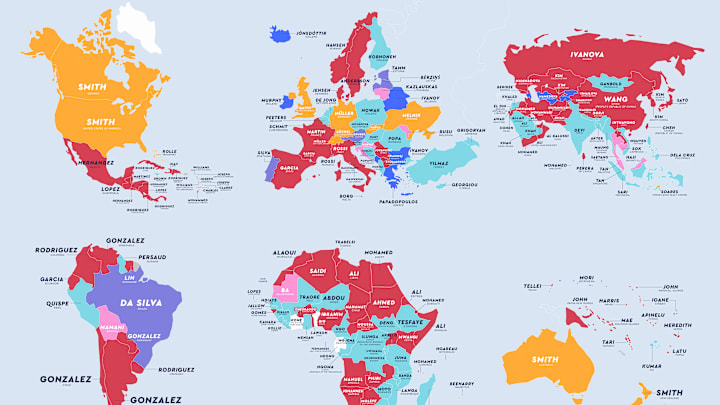Throughout history, different countries and cultures have taken to using last names at different times. One of the first was China, where the legendary emperor Fu Xi is said to have introduced a system of inherited surnames in 2852 BCE. In the West, though, surnames only began being used around 1000 CE, when the combined pressures of a growing population and a general shortfall of different first names led to last names being adopted as a new means of telling people apart.
Now, research by NetCredit is shedding yet more light on this intriguing aspect of our culture by exploring the most common last name in every country on earth—and discovering some interesting trends along the way.
Using data from national censuses and genealogical portal Forebears.io, the researchers at NetCredit first determined each country’s commonest name, and then—by cross-checking those names with various etymological resources and surname dictionaries—put each into one of six different categories: ancestral, occupational, geographical, toponymic (or place name), personal characteristics, and patronage.
The research shows that inherited ancestral names come out on top in the most countries around the world, with many using names that honor a father, a mother, or an ancestor. The likes of Sweden’s Andersson, Mexico’s Hernandez, and Russia’s Ivanova all fall into this category, as do many of the names from countries in Africa, Central Asia, and Central America.
Names alluding to some kind of personal characteristics also prove popular. In several African countries, “praise-names” take the top spot; for instance, the Democratic Republic of the Congo’s most common name, Ilunga, comes from Bantu and is specifically given to “a person who is ready to forgive any abuse for the first time, to tolerate it a second time, but never a third time.” Elsewhere, you’ll find the likes of Turkey’s Yilmaz (“unyielding, determined”), Madagascar’s Rakotomalala (“beloved child”), and Peru’s Quispe (“glass-like, a precious stone”). Finland’s most common surname, Korhonen, is somewhat less flatteringly defined as an “old hard of hearing person.”
The occupational name Smith (“metal-worker”) came out on top in much of the English-speaking world—including the U.S., Canada, the UK, and Australia—but occupational names remain relatively uncommon overall. The same is true of names describing someone’s patronage (like Iceland’s Jónsdottír, “daughter of Jón”), a geographical feature (Austria’s Grüber means “person who lives in a hollow”), or a place name (Horvat, the most common last name in Croatia, literally means “Croatian person.”)
Plotting this data on maps throws up some interesting continental trends, too. For example, although Spanish names dominate in South America because of the continent’s colonial history, the fact that two-fifths of Guyana’s population has Indian heritage means Persaud (an altered form of the Indian surname Prasad) comes out on top there. Likewise, the ethnic diversity of the islands of the Pacific Ocean means an English name is most common in Papua New Guinea, an Indian name in Fiji, and Japanese names in Micronesia and the Solomon Islands.

You can take a look at the full map of the world above, and see the full survey and analysis—as well as the continent by continent maps—here.
Read More Articles About Names:
